- Home
- Sicilian Culture
- Sicilian Writers
- The Leopard
From Book to the Netflix Series and Back: Exploring the World of The Leopard Novel
Today, Sicily is a trendy destination thanks to its beautiful beaches, sunshine, colorful history, and TV series like The White Lotus. Still, if you look at it through the eyes of the region's natives, things are not always so rosy. One such Sicilian was Giuseppe Tomasi di Lampedusa, author of The Leopard novel.
When Netflix released the series based on Lampedusa's The Leopard, it prompted me, after about ten years, to return to The Leopard novel. At its core, it is a story of how even though things change, the world remains fundamentally the same.
Set against a backdrop of opulence and political upheaval surrounding the unification of Italy in 1860, this literary masterpiece transports you to a world where power and passion collide with the demise of the old aristocracy.
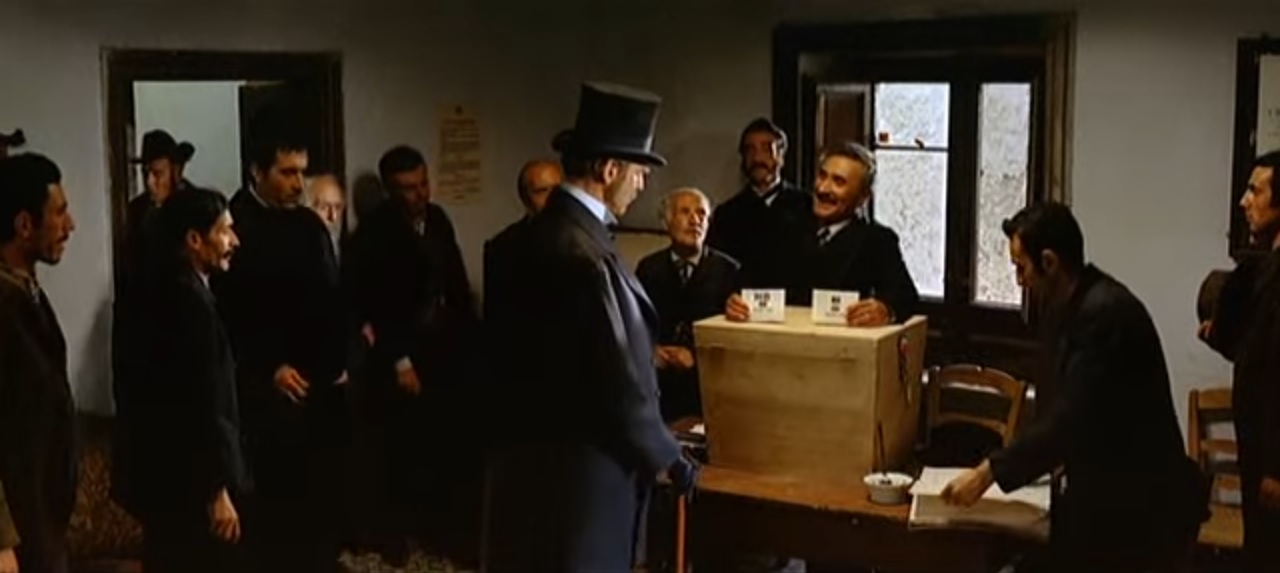 The Leopard was also made into a movie in 1963. Directed by Visconti and starring Burt Lancaster as Prince Fabrizio, the movie is considered a classic.
The Leopard was also made into a movie in 1963. Directed by Visconti and starring Burt Lancaster as Prince Fabrizio, the movie is considered a classic.Ultimately, Lampedusa's masterpiece argues that survival in a changing world necessitates a tragic compromise, in this case, compelling the old aristocracy to sacrifice its principles to preserve its legacy.
As I delved deeper into The Leopard novel, I was once again captivated by its vivid characters, their complex relationships, and timeless themes that resonate as ever today. But what struck me most was the book's description of Sicily itself.
People come and go, rulers change, but in the end, nothing really changes, says Lampedusa. And why? Because people's character, shaped by history and the forces of nature, stays the same. In this case, Sicilian character.
What is that national character that Lampedusa depicts, and what are the forces that have influenced it? That's what we'll get to in a moment. But first, let's take a quick look at the book and its author.
Giuseppe Tomasi di Lampedusa, The Last Leopard
Born into a noble Sicilian family in 1896, Lampedusa's aristocratic upbringing profoundly impacted his life and worldview. This is also very much reflected in his writing.
Lampedusa was nearing his 60th birthday when he wrote The Leopard novel. Although from an old aristocratic family, his life was marked by a series of personal tribulations.
First of all, the times had already dramatically changed before he was born. The power of the aristocracy had been eroded by the unification of Italy in 1861, and the old noble families started to gradually lose their power and wealth. This affected Lampedusas as well as other aristocrats.
The rapidly changing world also brought a lot of misery alongside progress. As a youth, Lampedusa fought in the First World War. He also lost his aunts in the great earthquake of Messina, which affected his dear mother's mental health.
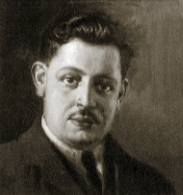 Giuseppe Tomasi di Lampedusa as a young man.
Giuseppe Tomasi di Lampedusa as a young man.Although the character of Prince Fabrizio in the book is modeled after Lampedusa's great-grandfather, there is also much of the author himself in it. For example, one cannot escape the thought that the author is speaking through the Prince's mouth, perhaps stating the ideas he has been brooding over for decades, when the Prince declares to a stateman from northern Italy:
"In Sicily it doesn't matter about doing things well or badly, the sin we Sicilians never forgive is simply that of 'doing' at all. We are old, Chevalley, very old. For over twenty-five centuries we've been bearing the weight of superb and heterogeneous civilisations, all from outside, none made by ourselves, none that we could call our own. We're as white as you are, Chevalley, and as the Queen of England; and yet for two thousand five hundred years we've been a colony. I don't say that in complaint; it is our fault. But even so we're worn out and exhausted."
Lampedusa's literary journey was not straightforward; he faced numerous rejections before The Leopard novel was published posthumously in 1958. The book, initially overlooked as a relic of the past, slowly garnered acclaim and became one of the most celebrated works of Italian literature.
Lampedusa was an avid reader, but he hadn't written anything before The Leopard. He also didn't have to work for his upkeep. What he had was time to think, observe the society he lived in, and reflect on its history.
Lampedusa's ability to weave personal and historical narratives into a cohesive whole is one of the reasons The Leopard novel resonates with readers even today. At the same time, his unique perspective, as an outsider because of his aristocratic heritage, lends a poignant layer to the exploration of class and identity in the book.
Lampedusa's death shortly before the novel's publication adds yet another layer of tragedy to his legacy, as he never lived to experience the success of his work. In this way, his life's end resonates with the novel's conclusion, which also explores the idea that individual beings and one's personal wishes are just grains of sand in the big scheme of things.
For those interested in the interplay between Lampedusa's experiences and the fictional world he created, I'd suggest reading the novel 'Lampedusa' by Steven Price, or the non-fiction 'The Last Leopard' by David Gilmour. Both of these books invite readers to explore the intricate relationship between the art and life of Giuseppe Tomasi di Lampedusa.
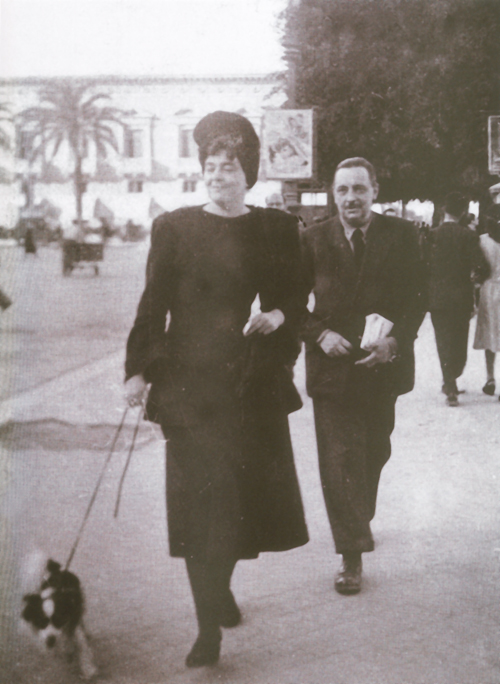 Lampedusa and his wife, "Licy," a Baltic aristocratic woman whom he married in 1932.
Lampedusa and his wife, "Licy," a Baltic aristocratic woman whom he married in 1932.Characters in The Leopard
The Leopard novel boasts a rich tapestry of characters, each contributing to the book's exploration of themes such as decay, ambition, and the passage of time.
Prince Fabrizio Salina, a profoundly introspective and complex figure, is at the heart of this intricate web. His character embodies the conflict between the old world of nobility and the emerging new order. As he reflects on his life, readers witness his struggles with identity, duty, and the inevitability of change.
Fabrizio's contemplative nature and poignant observations make him a memorable protagonist whose journey resonates with the reader on multiple levels.
Tancredi, the Prince's charismatic and ambitious nephew, is a counterpart to Fabrizio. Tancredi's character is a dynamic force within the narrative, representing the youthful drive for power and status. His famous line, "If we want things to stay as they are, things will have to change," encapsulates the novel's central dilemma.
Tancredi's relationship with Angelica, the daughter of a wealthy bourgeois, Mayor Calogero, further highlights the tension between social classes and the shifting power landscape in 19th-century Italy. Through Tancredi, Lampedusa explores themes of ambition and the often ruthless pursuit of success.
Tancredi's marriage to Angelica becomes the ultimate embodiment of the novel's central 'tragic compromise'—exchanging noble heritage for wealth and political relevance.
Angelica's character in the novel remains somewhat shallow. Her beauty captivates Fabrizio, and her union with Tancredi represents the merging of old and new social orders.
Angelica's character is made more multifaceted in the Netflix series; in the book, she appears more as an object of desire, while in the series, her own ambitions and desires are made more explicit. There's also much about Angelica in the series that isn't shown in the book.
Anyway, the interplay between these characters forms the emotional core of The Leopard, shedding light on the complexities of human relationships against the backdrop of historical change.
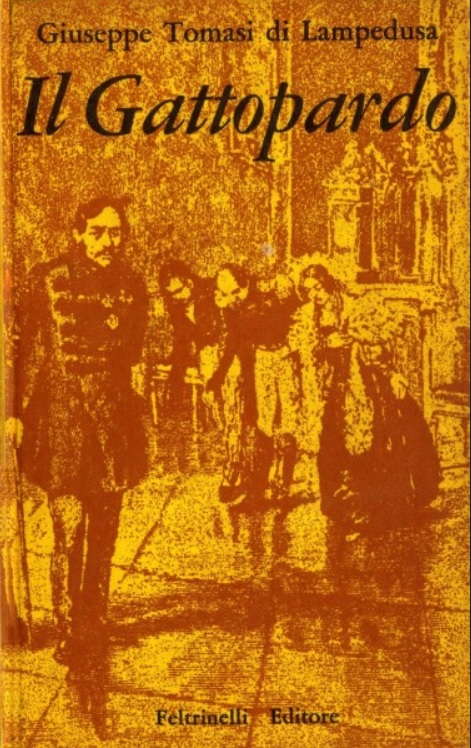 Italian edition of The Leopard.
Italian edition of The Leopard.Themes in The Leopard Novel
At the heart of The Leopard are several profound themes that resonate throughout the narrative. One of the most prominent themes is the inevitability of change and decay. This theme becomes increasingly persistent towards the end of the book.
This theme relates not only to the historical events described in the book but also to the author's own state of health. In describing the death of his Prince, Lampedusa was also dealing with his own worsening lung disease.
In the novel, Prince Fabrizio stands as a symbol of a fading era. As Italy undergoes unification, the old ways are supplanted by new ideologies. The tension between the established aristocracy and the rising bourgeoisie is palpable, with characters like Tancredi embodying the ambitions of a new generation eager to seize power.
Still, Tancredi, a joyful opportunist, gets the Prince's sympathy. He is the embodiment of the potential for positive change the future holds. His father-in-law, Mayor Calogero, is, then again, a more weaselly character. The Leopard novel, as well as the TV series, suggests that men like him are truly the ones who will inherit power in the future government.
The book was written in the 1950s, which was already the future as far as the events in it were concerned. The rise to power of both the Mafia and Mussolini had already happened. The Netflix series more directly shows Calogero's connection to the then-emerging Mafia.
This theme prompts one to consider the costs of progress and the sacrifices made in pursuit of success. Even though the change is inevitable, the freedom from the old restrictive forces doesn't mean that the future will necessarily be any brighter.
Lampedusa's message is that the people will not lose their nature, even if those in power change. In this respect, the book's message is fatalistic. The happiness of youth lasts only for a moment, while difficulties stay forever.
This somewhat depressing conclusion is softened in the Netflix series by plot twists that bring a happier ending for viewers to enjoy.
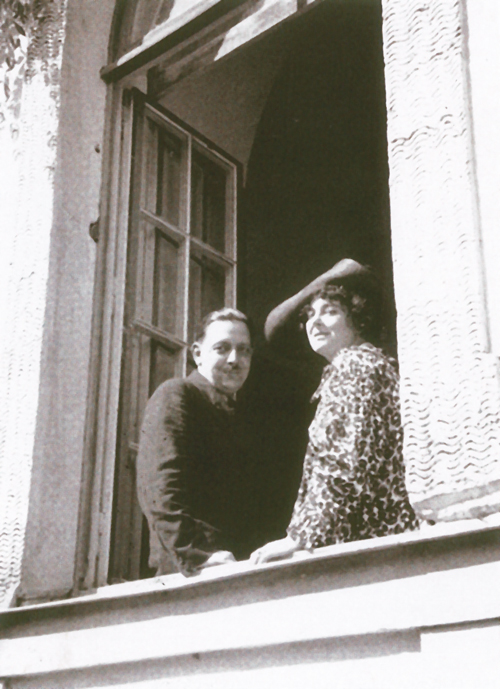 Giuseppe with his wife, who was a psychoanalyst. It would be surprising if his wife's profession had not contributed to the book's accurate psychological portrayal of human nature.
Giuseppe with his wife, who was a psychoanalyst. It would be surprising if his wife's profession had not contributed to the book's accurate psychological portrayal of human nature.Sicily as Reflected in The Leopard Novel
The beauty of The Leopard book lies in subtleties that take time to appreciate: a slow, thoughtful narrative that follows the noble mind of Prince Fabrizio. The plot is almost secondary.
The sentences don't always come clear on the first reading, but you'll happily savour them the second time over. This emphasis on style over plot is the reason why, on my first reading, only vague impressions remained.
Now, on the second reading, I also had the Netflix series to thank for bringing the plot to the fore. Especially when there were breaks in the reading, it was easy to return to the book once the story itself was clear in my mind. Thus, I could better enjoy the subtleties of the text.
The plot is based on the history of Sicily, and indeed Italy, from Garibaldi's celebrated landing in Marsala to his failed second attempt at revolution.
Most of the plot takes place between the two attempts. Garibaldi's first crusade brought about the unification of Italy into a single state. By the start of the second revolt, the new power was already established. The former rebels had infiltrated the new state, and he had lost his support.
As Italy transitions from a fragmented collection of states to a unified kingdom, Prince Fabrizio finds himself at a crossroads, caught between his loyalty to the old ways and the emerging political realities.
The novel opens with the Prince reflecting on his family's storied past and the opulence that once defined his life. However, as the pages turn, the stark realities of a changing world become apparent.
The culmination of the plot occurs during a lavish ball that serves as a microcosm of the shifting power dynamics, where the Prince must confront the reality of his fading legacy. The outside world starts crumbling before Prince's eyes, and at the same time, his own health begins to deteriorate.
As if to explain everything, the Prince looks to his homeland, the island of Sicily. He reveals his feelings in a speech to a representative from northern Italy who has come to ask him to become part of the new Senate.
For the Prince, the word Senate brings to mind only ancient Rome, and he is not interested in the offer he has received. He considers himself above all a Sicilian, a people with whom he has no high expectations, but to whom he still feels a sense of belonging through historical ties.
Ultimately, the theme of the book is linked in the Prince's mind to the Sicilian national character:
"Sleep, my dear Chevalley, sleep, that is what Sicilians want, and they will always hate anyone who tries to wake them, even in order to bring them the most wonderful of gifts ... All Sicilian self-expression, even the most violent, is really wish-fulfillment; our sensuality is a hankerin for oblivion, our shooting and knifing a hankering for death; our languor, our exotic ices, a hankering for voluptuous immobility, that is for death again; our meditative air is that of a void wanting to scrutinise the enigmas of Nirvana."
In Prince's view, this state of affairs has never been changed by changes in power throughout history:
"...all those rulers who landed by main force from all directions, who were at once obeyed, soon detested and always misunderstood; their sole means of expression works of art we found enigmatic and taxes we found only too intelligible, and which they spent elsewhere. All these things have formed our character, which is thus conditioned by events outside our control as well as by a terrifying insularity of mind."
Ultimately, according to Prince, it is the weather and natural conditions that are to blame:
"...this landscape which knows no mean between sensuous sag and hellish drought; which is never petty, never ordinary, never relaxed, as should be a country made for rational beings to live in..."
When half the year, the sun throws fire on their heads like some God's punishment, when water shortages, floods, and other extreme weather conditions occur around the year, people no longer have the energy left to do any sensible work. It has all been spent persevering at the mercy of nature.
Against this background, it is easy to understand the book's conclusion that it doesn't matter much whether the Norman, Arab, Spanish, French, or Italian government is in power; Sicily is not going to change. Above all, because the environment does not change.
According to Prince Fabrizio, only sleep or death can bring relief to the Sicilians. And as if to confirm this, the end of the book is a slow testimony to death. I can't think of any other book that describes death from the inside, at the level of the dying mind, as vividly as this one.
It's no wonder that the writers of the Netflix series decided to change the ending slightly. They further intensify the relationships between the characters and ultimately offer the viewer a sense of relief that is more than just loss.
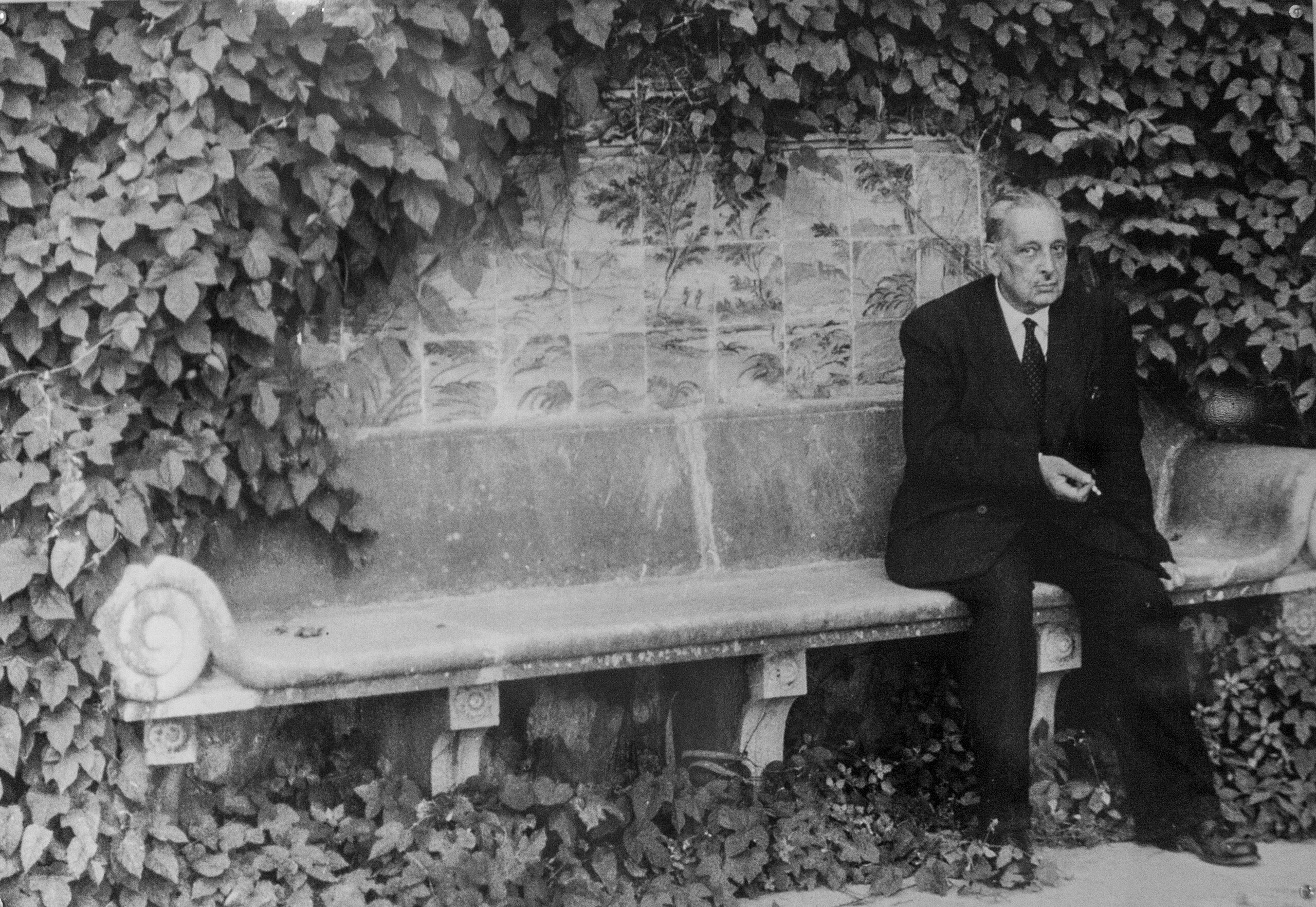 Giuseppe Tomasi di Lampedusa in his older days.
Giuseppe Tomasi di Lampedusa in his older days.Conclusion and Final Thoughts
In conclusion, The Leopard has definitely earned its place in the canon of world literature. The novel's exploration of themes such as tradition versus modernity, the passage of time, and the nature of ambition is as relevant now as ever.
As we step back from the labyrinthine corridors of Lampedusa's narrative, we are left with a profound sense of the human experience—its beauty, darkness, and capacity for transformation.
This journey reminds us that literature can illuminate the depths of the human soul, making The Leopard a timeless exploration of the beauty and darkness that coexist within us all.
The Netflix series based on the book may not be as artistically accomplished, but it nicely complements the reading experience.
The book has also been made into a classic film, The Leopard (1963), directed by Luchino Visconti, with Burt Lancaster playing the role of Prince Fabrizio. I have yet to see that.
(July 31, 2025)
Recent Articles
-
Car Rental in Sicily: A Traveler’s Guide
Feb 04, 26 01:09 PM
Planning car rental in Sicily? Learn costs by season, insurance basics, required documents, and more. -
The Best Things to Do in Sicily, From Antiquity to the Present
Feb 01, 26 09:01 AM
Explore the best things to do in Sicily through historic cities, Greek ruins, volcanoes, islands, and landscapes -
White Wines of Sicily: A Guide to Sicily's Best Varietals
Jan 06, 26 05:46 AM
Discover the unique white wines of Sicily, from the famous Grillo to the lesser-known varieties.
Follow MANY FACES OF SICILY on Facebook, Instagram, Bluesky & Tumblr
Contact: vesa@manyfacesofsicily.com







